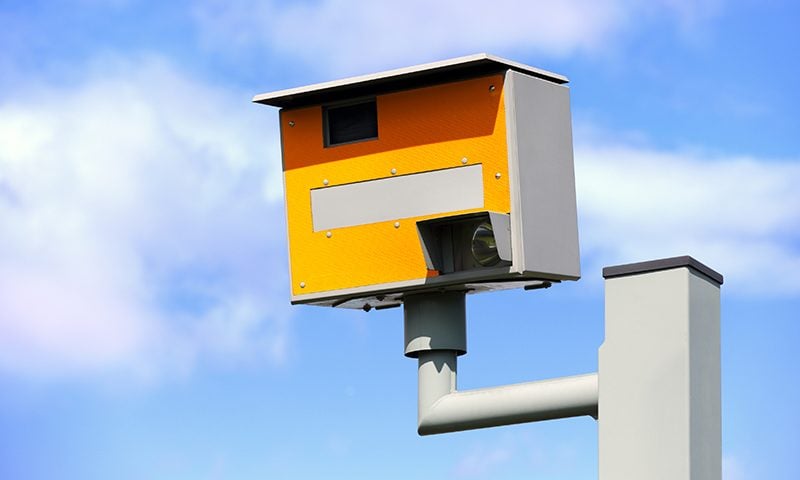10 of the most common driving laws broken in the UK

Driving offences are common and their punishments can range from on-the-spot fines and a penalty points on your licence to hefty fines and jail time.
We take a look at the ten of the most common driving laws broken each day in the UK — and what you can expect if you commit one of them.
1. Speeding
Not only is speeding the UK’s most common driving offence, in 2017 500 speeding fines were given out each day, it’s no wonder that it accounts for an estimated 70% of all convictions. And while some motorists will say that this isn’t surprising considering there are over 5,000 speed cameras on our roads, the shear amount of convictions will concern road safety campaigners. If you’re caught, expect at least three penalty points and a minimum fine of £100.
2. Using a phone while driving
It seems crazy now, but using a handheld phone while driving wasn’t actually illegal until 2006. Since then, the police and road safety campaigners have had a tough time getting through to drivers just how dangerous using your phone while driving can be. Tougher penalties were introduced in April 2017, with offenders now facing six penalty points and a fine of up to £1,000.
3. Careless driving
Careless driving — or, to give it it’s full name, driving without due care and attention — covers a multitude of driving sins, from getting distracted while eating fast food behind the wheel, to accidentally pulling out in front of someone. £100 on-the-spot fines and three penalty points are common for offenders, but more serious convictions involving fatal collisions could lead to disqualification, an unlimited fine, or even five years in jail.
4. Dangerous driving
Considered a more serious conviction than careless driving, dangerous driving is classed as driving that could potentially endanger yourself or others. This could include racing other motorists on public roads, overtaking dangerously, and deliberately ignore traffic signs and signals. Thankfully, the penalties for dangerous driving are severe and include unlimited fines, driving bans, and up to 14 years in prison.
5. Drink driving
It comes as no surprise that driving under the influence of alcohol has made it into the top 5 driving laws broken. If you’re planning on driving then it’s advisable that you avoid drinking any alcohol at all. The legal limit is 80mg per 100ml in England, Northern Ireland, and Wales, while in Scotland the limit is 50mg per 100ml. Punishments are decided by the magistrates court, but if you’re involved in a fatal collision with under the influence expect a long jail sentence. If you’re unsure whether you’re over the limit then don’t risk it — take a taxi!
6. Driving without insurance
Having car insurance is a legal requirement in the UK, and it can cover you and other motorists should something unexpected happen on the road. If you’re caught without sufficient insurance cover, then the police can hand out fixed penalties of £300 and six penalty points. If your case goes to court, then you could face an unlimited fine and a driving ban.
7. Failing to comply with your licence
You might be surprised that this has made it into the top 10 driving laws broken, but it’s actually a lot more common than you think. Tcan cover a number of different offences and simply means that you’re driving in a way that your current licence does not allow. This could be learner drivers driving without L plates, or even driving when disqualified. Offenders face six penalty points, a fine of up to £1,000 and, if you’re not already disqualified, a driving ban.
8. Having the incorrect car seat for your child
Up to a certain age and height, children should use a specially-designed car seat when travelling in the car to ensure they’re adequately protected if they’re involved in a collision. If your child isn’t using the correct car seat, or the seat hasn’t been fitted properly, you could face a £30 penalty. For more information on car seats, and to make sure your child is using the correct one, read our complete guide to child car seat laws.
9. Drug driving
Like drink driving, it’s also against the law to drive while under the influence of drugs. And it’s not just illegal drugs, either. Most drug driving offenders are pulled over because they’ve been taking prescription drugs — so watch your dosage and check whether you’re able to drive on meds. Anyone caught drug driving faces a year’s ban, an unlimited fine, and even a jail sentence.
10. Driving with no MOT
Your car should undertake an MOT every year so that a mechanic can check that it’s still roadworthy. Driving if your car is not covered by a valid MOT could see you hit by an on-the-spot fine of £100 whether your car is roadworthy or not. Should the police find that your car isn’t actually roadworthy, then the punishment can be even worse.
Now you know the most common driving laws broken in the UK why not acquaint yourself with the driving laws you could be breaking every day.


